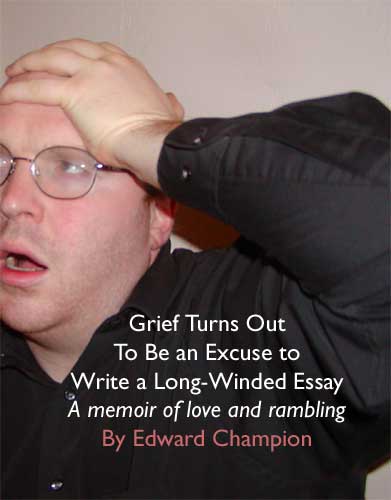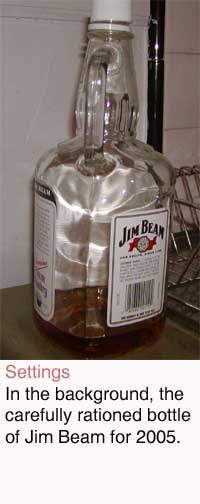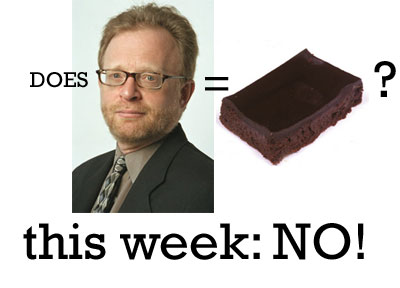
1
Blog life changes fast.
Blog life changes more times than you can change your underwear.
You sit down to lunch and you know that there’s a blog awaiting you.
The question of pity parties.
Those were the first words I wrote after it happened. I had sent off yet another epistle to a media outlet. Mr. Tanenhaus’s assistant had personally telephoned me, telilng me that I was “chasing windmills” and that the New York Times office would no longer be accepting my brownie shipments. I can’t be sure about the dating on the Microsoft Word file (“Last-ditch olive branch letter to Sam Tanenhaus.doc,” I think it was called). I had long since deleted it and freed up that portion of my hard drive to download more porn. I sure as hell was’t Joan Didion, who clearly had more important things to say to the Gray Lady’s affluent and upper middle class demographic. I could sweat long and hard on a thoughtful essay about Gilbert Sorrentino or the interesting history of Soft Skull Press, but in the end if Didion wanted to write some 6,000 word essay on the sensation of putting two quarters into a soda machine, she’d have top priority and wouldn’t be edited at all. Never mind that I had suffered my own personal grief in 2005 and had used my sense of humor and perseverance to keep on writing.
For a long time I wrote haikus.
Blog life changes more times than you can change your underwear.
The ordinary underwear, not the expensive boxers I wear to give girlfriends smooth and easy access.
At some point, in the interest of remembering that letter, I decided not to allow myself to be crippled by morally complex decisions. Instead of laboring over a Word file, I wrote half a play, traded notes with a producer about a screenplay we were developing, banged out a lot of words on a novel-in-progress, began a literary podcast, and continued to blog profusely. All this with a full-time job. Like most writers, I didn’t have the luxury of a literary reputation to fall back on. I saw immediately that quibbling over the haikus was probably a bad idea, because, really, what good is there in laboring months over a sentence? I recognize now that there is nothing unusual in this, that most writers aren’t nearly high-profile enough to earn that particular advantage and that the Times was culpable in allowing a talented writer to take a colossal misstep, playing into the sympathies of a liberal elite that had very likely never known a day without a hot meal, much less stretched their hand across the class chasm to listen to and understand the very people they purported to support. Maybe back in 1966, when they were hungry and struggling and dealing with editors who would call them on their shit, these writers might be capable of stunning us with their amazing powers of observation; without exception, they had declined to do this for quite some time, never deigning to speak with the freaks and the bohemians and the dissidents and the crackheads and the troubled souls so regularly observed in my everyday life (but apparently not theirs) that the Sunday Times Magazine had so regularly ignored. Instead, they bankrolled top talent and suggested that they write about vacuity. They played into the whole essayist superstars mythos. And all this as the New York Times Company had laid off staff while silently pondering why the shares had dropped.
 “And then — blogged.” In the midst of life we are surrounded by obsessions, and I had said this sentence one too many times. It had not been said by any philosopher of note. Later I realized that my rage at the newspapers, compounded by their deafness to my creative pitches, is what led me to become some febrile chronicler of literary motifs and happenings. Friends were kind enough to not tell me directly that I was chasing windmills, letting me find out for myself that such a regular plan was far from tenable. Never once did I exploit the intimate details of my personal life. All this without that bradykinetic yet pivotal period of thinking, of allowing dreams to unfold and wild ideas to transform into arguments and complex tales.
“And then — blogged.” In the midst of life we are surrounded by obsessions, and I had said this sentence one too many times. It had not been said by any philosopher of note. Later I realized that my rage at the newspapers, compounded by their deafness to my creative pitches, is what led me to become some febrile chronicler of literary motifs and happenings. Friends were kind enough to not tell me directly that I was chasing windmills, letting me find out for myself that such a regular plan was far from tenable. Never once did I exploit the intimate details of my personal life. All this without that bradykinetic yet pivotal period of thinking, of allowing dreams to unfold and wild ideas to transform into arguments and complex tales.
One thing’s for sure: there was never any hired help named Jose to pick up my mess. I cleaned my own toilet. I washed my own dishes. Every week, I picked up the detritus. And I never once asked my reading public to feel sorry for me through such a shameless publicity stunt: a desperate attempt to draw in more readers by headlining one individual’s personal misery.
2
August 23, 2005, a Tuesday.
I had ordered a large pizza.
I had seen the pizza advertised in a leaflet that had somehow been crammed into my mailbox and decided to give it a shot.
The pizza, with its pepperoni and mushrooms, would give me the strength to blog some more.
The pizza man arrived, I tipped him generously, I offered two slices to a friend and one to a homeless lady in my neighborhood.
All this, of course, is unimportant. But one must understand the exact contents in which the Tanenhaus letter was sent.
If the pizza could be said to have any feelings, I’m guessing it would have felt relieved yet somewhat homicidal as the pizza slicer partitioned it into eight pieces. If it could read, the pizza would probably be reading Sun Tze’s The Art of War, which is particularly sad, as the pizza itself was unarmed and had no appendages, much less a sentient mind, with which to attack its assailants.
The pizza was scarfed down by dawn.
Another one was ordered less than two weeks later. It was a pretty good idea, considering the untold burden of grief.
* * *
 I used to have a large white dry erase board in my small rented room, for reasons having to do with a silly effort at appearing professional. Initially, I drew task lists for what I needed to do during any given week. But because the markers were colorful, I soon began drawing obscene pictures involving stick figures in flagrante delicto. I would invite friends to come by to play drunken games of Pictionary, carefully rationing the large bottle of Jim Beam that I had purchased on sale at a Safeway earlier in the year. I was using the dry erase board as a way to keep things going in light of the grief that threatened to destroy my routine.
I used to have a large white dry erase board in my small rented room, for reasons having to do with a silly effort at appearing professional. Initially, I drew task lists for what I needed to do during any given week. But because the markers were colorful, I soon began drawing obscene pictures involving stick figures in flagrante delicto. I would invite friends to come by to play drunken games of Pictionary, carefully rationing the large bottle of Jim Beam that I had purchased on sale at a Safeway earlier in the year. I was using the dry erase board as a way to keep things going in light of the grief that threatened to destroy my routine.
I sobbed as I scrawled those naughty pictures of stick figures. At the time, I wasn’t getting any and I had resorted to relentless masturbation to maintain my sangfroid. So should we all.
There was still no hired man named Jose who would help me balance my checkbook. I couldn’t afford such a man. Like most people, I had to sort this all out by myself.
But the dry erase board helped, even if it proved the wrong conduit for me to organize my life.
3
I had to believe that the grief could die. I had to believe that learning to laugh at the crazy world around us, without resorting to a long-winded personal essay, was the right road out.
I did lots of laughing in the months that followed. I’ve always done a lot of laughing. I’ve been kicked out of funeral homes for laughing. The fault, I suppose, is mine.
Yet.
I didn’t own a car and I slept on a futon. What kind of conditions were these for a man in his early thirties? Would things eventually happen for me because I had a pretty strong work ethic and produced who knows how many thousands of words? If there were any deficiencies in the way that I was approaching this, it was perhaps the simple fact that the things that interested me were quirky and alternative and not always highbrow. I had actually enjoyed The 40 Year Old Virgin! What was wrong with me?
Dale Carnegie, in How to Win Friends and Influence People, points out that the essential characteristic of winning people over is to dun your nose as you listen to a person of influence. Certainly, people interested me and I fancied myself a halfass listener. But why should anyone have to suffer fools gladly when one exists in either an imagined or a palpable sense of grief? Why should anyone reveal so many pedantic details to move newspapers? Shouldn’t some things be kept close to one’s chest? Shouldn’t more substantial things be written about?
The smell of sweet bullshit.
That was one way I could come to terms with this ethical conundrum.
I did not anticipate a midlife crisis at the age of 31.


 “And then — blogged.” In the midst of life we are surrounded by obsessions, and I had said this sentence one too many times. It had not been said by any philosopher of note. Later I realized that my rage at the newspapers, compounded by their deafness to my creative pitches, is what led me to become some febrile chronicler of literary motifs and happenings. Friends were kind enough to not tell me directly that I was chasing windmills, letting me find out for myself that such a regular plan was far from tenable. Never once did I exploit the intimate details of my personal life. All this without that bradykinetic yet pivotal period of thinking, of allowing dreams to unfold and wild ideas to transform into arguments and complex tales.
“And then — blogged.” In the midst of life we are surrounded by obsessions, and I had said this sentence one too many times. It had not been said by any philosopher of note. Later I realized that my rage at the newspapers, compounded by their deafness to my creative pitches, is what led me to become some febrile chronicler of literary motifs and happenings. Friends were kind enough to not tell me directly that I was chasing windmills, letting me find out for myself that such a regular plan was far from tenable. Never once did I exploit the intimate details of my personal life. All this without that bradykinetic yet pivotal period of thinking, of allowing dreams to unfold and wild ideas to transform into arguments and complex tales.  I used to have a large white dry erase board in my small rented room, for reasons having to do with a silly effort at appearing professional. Initially, I drew task lists for what I needed to do during any given week. But because the markers were colorful, I soon began drawing obscene pictures involving stick figures in flagrante delicto. I would invite friends to come by to play drunken games of Pictionary, carefully rationing the large bottle of Jim Beam that I had purchased on sale at a Safeway earlier in the year. I was using the dry erase board as a way to keep things going in light of the grief that threatened to destroy my routine.
I used to have a large white dry erase board in my small rented room, for reasons having to do with a silly effort at appearing professional. Initially, I drew task lists for what I needed to do during any given week. But because the markers were colorful, I soon began drawing obscene pictures involving stick figures in flagrante delicto. I would invite friends to come by to play drunken games of Pictionary, carefully rationing the large bottle of Jim Beam that I had purchased on sale at a Safeway earlier in the year. I was using the dry erase board as a way to keep things going in light of the grief that threatened to destroy my routine.  In a letter, New York Times Executive Editor Bill Keller
In a letter, New York Times Executive Editor Bill Keller  One can make the same case for Sarah Boxer’s columns. A healthy dose of skepticism is one thing. But Ms. Boxer’s columns are, for the most part, large dollops of bitter reactionary bullshit. She’s about as flexible to culture as hardened doss sticks. I’ve yet to see Ms. Boxer crack so much as a smile or let down her guard in any way. I suppose this is because, in the Boxer universe, all forms of DIY or independent culture are essentially bullshit. The people who try something different are no less than crazed dilletantes. Ideally, these upstarts should be mowed down by machine guns, lest they tango with the status quo or, even worse, disrupt Ms. Boxer from the west wing in her seculded estate. Damn these artists! They’ve deigned to force Ms. Boxer to actually think and write a column!
One can make the same case for Sarah Boxer’s columns. A healthy dose of skepticism is one thing. But Ms. Boxer’s columns are, for the most part, large dollops of bitter reactionary bullshit. She’s about as flexible to culture as hardened doss sticks. I’ve yet to see Ms. Boxer crack so much as a smile or let down her guard in any way. I suppose this is because, in the Boxer universe, all forms of DIY or independent culture are essentially bullshit. The people who try something different are no less than crazed dilletantes. Ideally, these upstarts should be mowed down by machine guns, lest they tango with the status quo or, even worse, disrupt Ms. Boxer from the west wing in her seculded estate. Damn these artists! They’ve deigned to force Ms. Boxer to actually think and write a column! Leiter suggests that Vollmann “bizarrely ascribes” a “realism” to Nietzsche and suggests that Nietzsche does not hold the view that “cruelty is innate,” complaining that Vollmann fails to cite a specific passage. I’m fairly certain that Vollmann was suggesting one of Nietzsche’s most infamous statements from Thus Spake Zarathrusta, something that a certain Austrian perhaps took too much to heart: “Man is the cruelest animal. Whatever is most evil in his best power and the hardest stone for the highest creator.” Far from a “People magazine speculation,” Vollmann is willing to give the NYTBR readership the benefit of the doubt, presuming that they are familiar with Nietzsche’s basics. Further, Vollmann framed the “realism” within quotes, leaving little question to the reader that this was a speculation on Nietzsche’s capacity to tell the truth about the human race. This commonality, of course, what separates Vollmann’s work from many of his contemporaries on both the fiction and the nonfiction fronts.
Leiter suggests that Vollmann “bizarrely ascribes” a “realism” to Nietzsche and suggests that Nietzsche does not hold the view that “cruelty is innate,” complaining that Vollmann fails to cite a specific passage. I’m fairly certain that Vollmann was suggesting one of Nietzsche’s most infamous statements from Thus Spake Zarathrusta, something that a certain Austrian perhaps took too much to heart: “Man is the cruelest animal. Whatever is most evil in his best power and the hardest stone for the highest creator.” Far from a “People magazine speculation,” Vollmann is willing to give the NYTBR readership the benefit of the doubt, presuming that they are familiar with Nietzsche’s basics. Further, Vollmann framed the “realism” within quotes, leaving little question to the reader that this was a speculation on Nietzsche’s capacity to tell the truth about the human race. This commonality, of course, what separates Vollmann’s work from many of his contemporaries on both the fiction and the nonfiction fronts. With such inevitability and the persistent strain of soccer moms fearing that the terrorists could firebomb the small-town high school fields they regularly frequent at any second, some of the most ambitious novelists are not only addressing this climate of fear but going a bit hogwild in their depictions, leaving a legacy that is not only quite silly but good for drawing
With such inevitability and the persistent strain of soccer moms fearing that the terrorists could firebomb the small-town high school fields they regularly frequent at any second, some of the most ambitious novelists are not only addressing this climate of fear but going a bit hogwild in their depictions, leaving a legacy that is not only quite silly but good for drawing 

